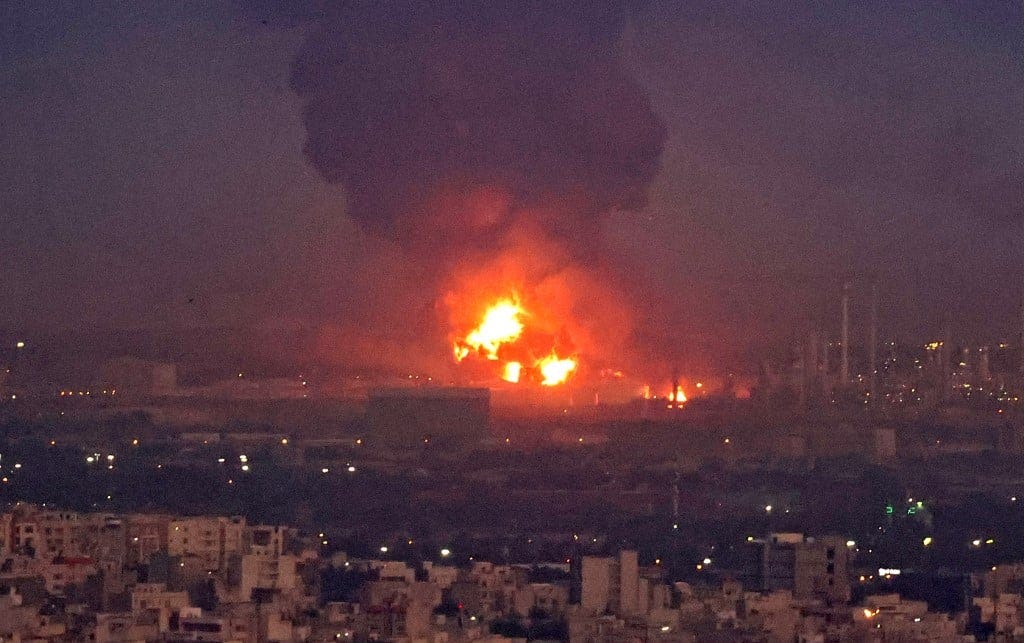Israeli Attack on Iran Affects China's Oil Supply
Beijing's oil interests in Iran come under duress
By: Tim Daiss
Beijing’s oil interests in Iran have come under duress, with Beijing fuming at Israel for its bombing campaign. They might not come right out and say it, but they don’t have to. It not only lurks beneath official government statements and rhetoric, but its overtones are surfacing in Chinese media. With the US now having attacked Iran’s nuclear sites, given the possibility of Iranian retaliation on shipping, the situation is even more fraught.
On June 14, a day after Israeli jets launched a large-scale strike on Iranian military and nuclear sites, China’s UN representative, Fu Cong, condemned Israel’s violation of sovereign security and territorial integrity and urged Israel to “immediately cease all military adventurism.” He made his comments at the UN Security Council’s emergency meeting on the Middle East.
Fu added that China would continue to support political and diplomatic efforts around the Iran nuclear issue in what he described as a responsible, objective, and impartial manner, along with firmly safeguarding the international nuclear non-proliferation mechanism, and upholding peace and stability in the Middle East.
Israeli jets not only pinpointed Iran’s nuclear sites and its top nuclear scientists and political and military leaders, but also its oil infrastructure. They took out Tehran’s main gasoline depot and its central oil refinery in separate parts of the capital, engulfing the sky in smoke and flames during the first days of the bombing.
The Shahran fuel and gasoline depot, which has at least 11 storage tanks, was also hit and set afire during the Israeli attack, Iran’s oil ministry said in a statement. Earlier, Israel also struck two key Iranian energy sites, including a section of the South Pars Gas Field, which is one of the world’s largest and critical to Iran’s energy production.
A few days later, Chinese Foreign Minister Wang Yi said that "Israel’s actions violate international law. We cannot just stand by and watch." A report in the Beijing-based Global Times, which often expresses the views of the Chinese Communist Party (CCP), said that “Israel’s reckless actions will only lead to a bigger disaster.”
Notably, a strong Iran not only fits into Beijing’s Middle Eastern political playbook but its oil supply plans. A weakened country, or worse yet for the CCP, an overthrown regime in Tehran, would not bode well for China’s energy security. Much of this is based on a massive deal struck between the two sides in 2021 when China agreed to invest some US$400 billion in Iran over a 25-year period.
The deal included billions of investments to be made in several dozen fields, including banking, telecommunications, ports, railways, healthcare, and IT. In exchange, China would receive a regular and heavily discounted supply of Iranian oil, The New York Times reported at the time, citing an Iranian official and oil trader. True to form, now and at the time, Beijing called for Washington to “rescind its sanctions on Iran over its nuclear development” as well as “remove its long arm of jurisdictional measures that have been aimed at China, among others.”
Equally as much as Beijing wants deeply discounted Iranian oil, Washington wants to keep it off the market. On March 20, for the first time, US sanctions included what’s commonly referred to as Chinese “teapot” refineries that have connections to Iran. These smaller facilities are primarily located in Shandong province, and are independently owned non-state-run refiners that process fuel oil and bitumen into transportation fuels or asphalt, often operating on very thin margins. Teapots usually misrepresent the origin of their oil products to conceal that they are from sanctioned countries, and are usually bought at heavily discounted prices.
It was the fourth round of sanctions slapped against Iranian oil sales by the U.S. since President Donald Trump indicated in February that he was re-imposing a “maximum pressure” campaign, including efforts to reduce Iran’s oil exports to zero. Not surprisingly, Beijing doesn’t recognize U.S. sanctions and remains the largest importer of Iranian crude. China and Iran have also built a trading system that uses Chinese Yuan and a complex network of brokers and middlemen to avoid trading in dollars, thus skirting exposure to U.S. regulators.
In 2024, China imported around 1.5 to 2 million barrels per day (bpd) of Iranian crude oil, according to multiple sources, including industry analysts and tracking data. This represents a significant portion of Iran's total crude oil exports. Some estimates indicate that China buys 90% of Iran's exported crude. China's official customs data service, however, underreports these figures.
China is so intent on securing oil shipments from Iran that it recently commissioned the China-Iran rail corridor, a massive 6,500-mile (10,400 km) railroad line stretching from Xi’an to the Aprin dry port near the Iranian capital Tehran. The line reportedly cuts shipping time by sea from 30-40 days to just 15 by rail, according to a report by Russian media outlet Sputnik. Dual-load freight trains are now running between China and Iran, bringing the planned China–Iran–Europe railway corridor closer to fruition, the report said.
It added that the project is integral for both countries since it: 1. Speeds up Chinese exports to Europe. 2. Streamlines Iranian oil exports to China. 3. Bypasses US-controlled chokepoints like the Malacca Strait. “It isn’t just about logistics — it’s a geostrategic power play, undercutting US efforts to isolate China and cripple Iran’s oil trade,” the Sputnik report said.
How Israel’s and now the US’s bombing campaign against Iran plays out in the days and weeks ahead is anybody’s guess. However, a main source of Chinese oil supply is already compromised. Moreover, depending on how the war unfolds, Iranian crude could also be completely removed from China’s oil supply playbook, likely sending Beijing scrambling for damage control.
Tim Daiss writes about energy for Asia Sentinel


weak tweets dont bother putin, as long as trump keeps taking action that benefits russia's economy.